How Much Funding Goes to Childhood Cancer Research
NCI's Childhood Cancer Data Initiative (CCDI) is building a community centered around childhood cancer care and research data. Through enhanced data sharing, we can improve our understanding of cancer biology to improve preventive measures, treatment, quality of life, and survivorship, as well as ensure that researchers learn from every child with cancer.
While childhood cancers represent the leading cause of death in children over the age of 1, they are collectively rare, comprising approximately 1%‒3% of cancers diagnosed annually in the United States. Information on diagnosis, treatment, and outcomes is often stored at the hospital or institution where a child is treated, making it difficult to answer scientific questions about childhood cancer.
Sharing clinical care and research data generated by children's hospitals, clinics, or networks broadly with the community can help us learn faster and on a scale much larger than any single institution caring for children can learn on its own.
CCDI Annual Symposium
The Childhood Cancer Data Initiative (CCDI) Annual Symposium was held on November 9, 2021. The purpose of the symposium was to provide an update on activities to-date, and to exchange information to continue the momentum of progress from the first two years of CCDI.
Watch the 2021 CCDI Annual Symposium recording.
A National Commitment
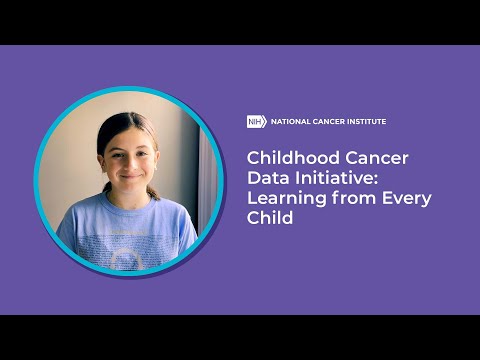
Childhood Cancer Data Initiative (CCDI) Learning from Every Child
The Childhood Cancer Data Initiative (CCDI) is building a community centered around childhood cancer care and research data. Members of the pediatric cancer community discuss the CCDI and share its need, purpose, and aims to help all children, adolescents, and young adults with cancer.
CCDI is a $50 million federal investment made in each fiscal year (FY) 2020 and FY 2021, with an additional $50 million proposed each FY for the next 8 years. These funds allow NCI to bring the nation's childhood cancer research, advocacy, and care communities together in this ambitious effort in data collection, sharing, analysis, and access.
In the first year of the initiative, NCI's Board of Scientific Advisors (BSA) convened a multidisciplinary working group to guide and inform the priorities and structure of CCDI. Delivered to NCI in June 2020, the working group report includes 24 recommendations for the initiative.
For CCDI's first year, NCI focused largely on strengthening existing childhood cancer research programs, developing systems, and building on the working group report to support future CCDI activities. NCI allocated CCDI funds to a range of childhood cancer and survivorship research activities through grants and supplements to build a foundation for data sharing, analysis, and access.
CCDI Foundational Goals
Drawing from the BSA working group recommendations, three foundational goals for CCDI have been established:
- Gather data from every child, adolescent, and young adult diagnosed with a pediatric cancer, regardless of where they receive their care
- Create a national strategy of appropriate clinical and molecular characterization to speed diagnosis and inform treatment for all types of pediatric cancers
- Develop a platform and tools to bring together clinical care and research data that will improve preventive measures, treatment, quality of life, and survivorship for pediatric cancers
CCDI Structure
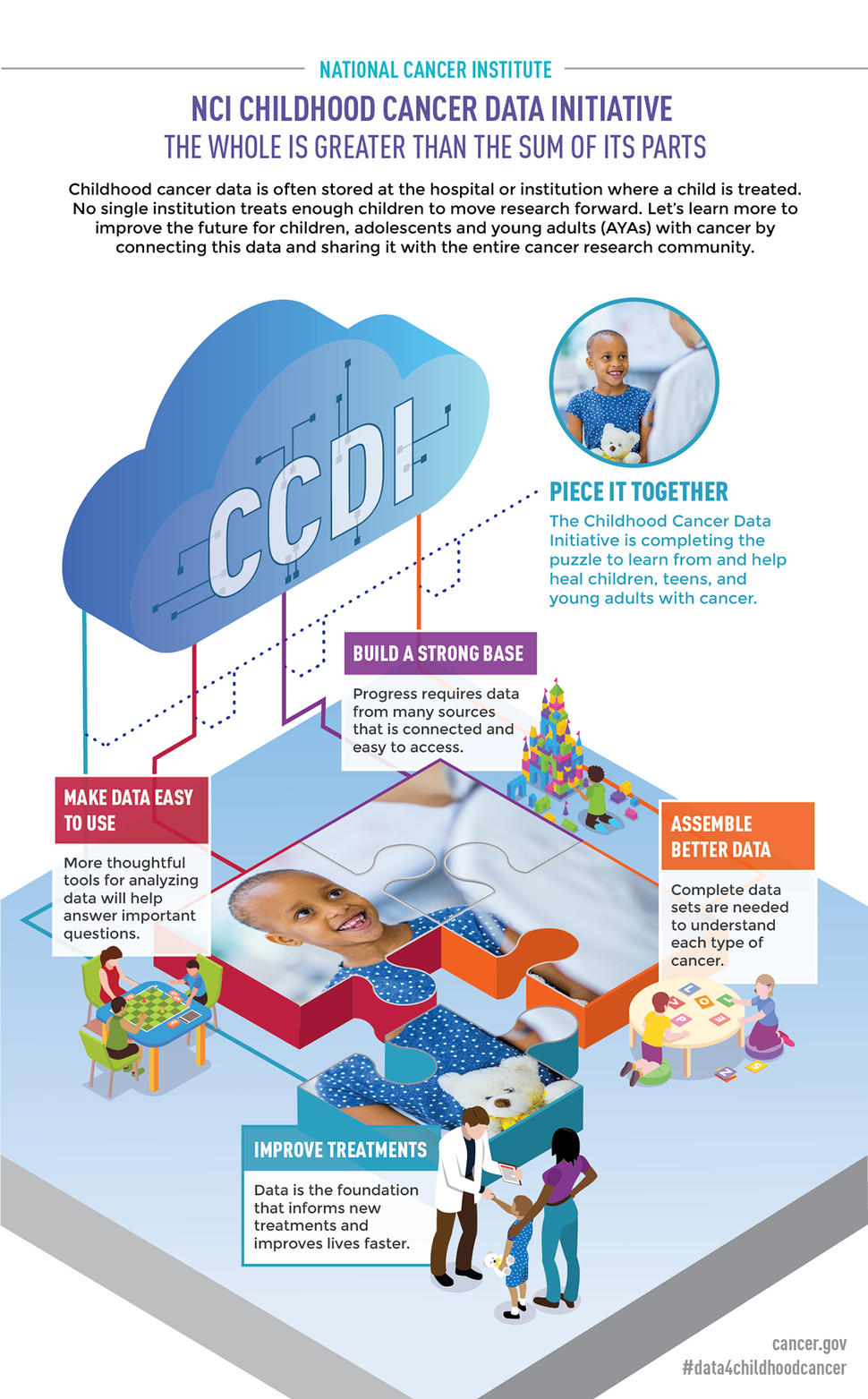
For CCDI to be successful, it requires the engagement of the entire childhood cancer care and research community. To enable broad participation, CCDI is organized into committees and working groups that include diverse representation from the childhood cancer community (experts from within and outside NCI), including diverse advocates, pediatric oncologists, researchers, and data scientists that represent the children, adolescents, and young adults served. To focus and align CCDI priorities, a steering committee will provide strategic direction and feedback on working group activities and will collaborate with the community through an engagement committee.
CCDI Steering Committee
The CCDI Steering Committee provides overarching direction on high-level strategic goals and scientific priorities that inform all CCDI activities. The steering committee will ensure plans, decisions, and actions are prioritized and aligned with broader NCI and CCDI goals. Additionally, the committee will recommend ways to maximize the impact of CCDI on accelerating progress in childhood cancer research, prevention, care, and survivorship.
CCDI Engagement Committee
The CCDI Engagement Committee identifies ways to engage the broader childhood cancer community as critical partners to align needs and maximize the success of CCDI. The engagement committee will ask for community input and work to understand the data, education, and analytics needs of researchers, care providers, advocates, and patients and their families. The committee will identify opportunities, both within the United States and in other countries, for partnerships that enhance childhood cancer research and outcomes.
CCDI Childhood Cancer Data Platform
The CCDI Childhood Cancer Data Platform working group is defining a strategy to create a platform, or infrastructure, to enhance sharing of new and existing data from NCI and other sources. The platform will link existing and future data from multiple children's hospitals and cancer institutions with community-based and NCI-supported childhood data resources. The platform will provide patient-level data from all federated sources, including preclinical, clinical, biological, and public health research data. The platform will also include tools for analyzing and visualizing data to help improve treatments for childhood cancers in alignment with the Research to Accelerate Cures and Equity (RACE) for Children Act.
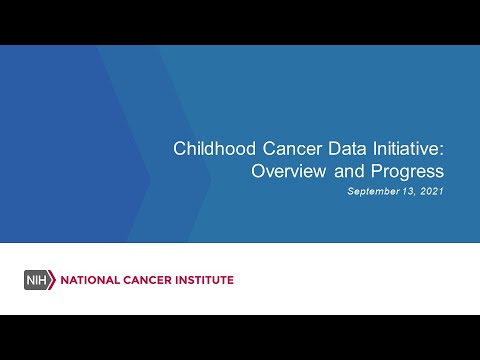
Childhood Cancer Data Initiative (CCDI): Overview and Progress Webinar
This webinar provides an overview of CCDI, including foundational goals and vision, as well as an update on two programs within CCDI, the National Childhood Cancer Registry and the Molecular Characterization Protocol.
Data collected and generated through NCI-supported childhood cancer initiatives will be broadly available through repositories and registries that make up the federated platform. The platform will support a central portal to make data easy to find and use. Facilitating new discoveries and analysis of childhood cancer data across different repositories and registries will accelerate progress in treating and understanding every patient's cancer.
CCDI National Childhood Cancer Cohort
The CCDI National Childhood Cancer Cohort working group is developing a set of strategies to gather data from every child diagnosed with cancer in the United States. The cohort will provide a means of identifying patients and survivors of childhood cancers, including those diagnosed and cared for outside of NCI-supported childhood cancer networks to ensure representation across the full spectrum of disease and allow for comprehensive follow-up throughout their lives.
To help meet cohort objectives, NCI has developed the rapidly growing National Childhood Cancer Registry (NCCR) to leverage the nation's existing, primarily adult, cancer registries to identify and follow childhood cancer cases in the United States. Development of a national childhood cancer registry was identified by the BSA working group as necessary to capture information on every child with cancer and to improve knowledge about childhood cancers.
NCCR*Explorer provides access to data from NCCR. Users can explore aggregated incidence and survival data and create figures for presentations or reports.
CCDI Childhood Molecular Characterization Protocol
The Childhood Molecular Characterization Protocol working group is developing a national strategy to provide detailed clinical and molecular information to every child with cancer, including data that will help a pediatric oncologist treat that patient and help researchers learn more about childhood cancers.
Childhood Cancer Data Initiative Vision
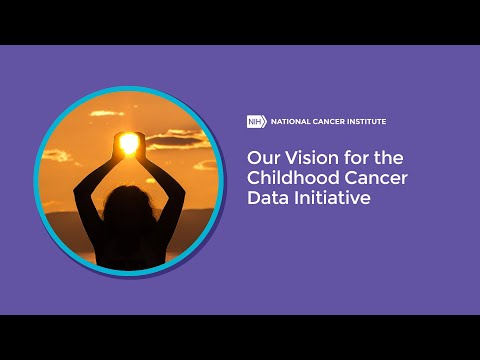
Childhood Cancer Data Initiative Vision
The Childhood Cancer Data Initiative (CCDI) is building a community centered around childhood cancer care and research data. Advocates and researchers within the pediatric cancer community discuss the CCDI and share its importance, goals and potential outcomes for treating children and AYAs with cancer.
The initial phase of the protocol will build on the Children's Oncology Group's Project:EveryChild and is open to all children with cancer, including those treated at community hospitals and clinics. By 2022 CCDI aims to provide clinical and molecular characterization to approximately 3,000 children diagnosed with specific hard-to-treat cancers, with plans to expand to more cancer types in future years. The effort also represents a collaboration between CCDI and biospecimen collection projects that NCI is supporting through its implementation of the Childhood Cancer Survivorship, Treatment, Access, and Research (STAR) Act. NCI envisions the protocol will inform which levels of characterization become standard for all children with cancer.
CCDI Cross-Cutting Issues Team
The CCDI Cross-Cutting Issues team will address key topics and issues that affect multiple working group activities within the initiative. The team will develop guidelines and approaches to ensure that activities can be implemented in a consistent manner across working groups and in alignment with CCDI priorities. The team will focus strategies on critical issues such as common data elements, data harmonization, standards and terminologies, data utility, integrating CCDI-wide biobanking in coordination with the STAR Act, consent and assent, obtaining scientific input from extramural communities, and establishing a data governance system to ensure long-term use and sustainability.
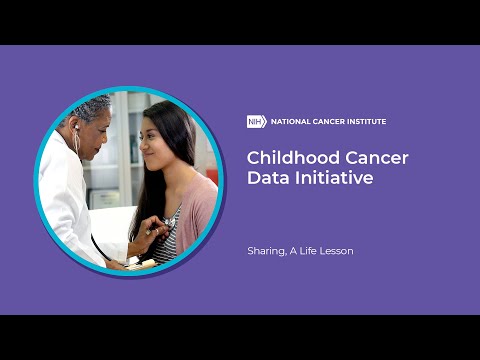
Childhood Cancer Data Initiative: Sharing, A Life Lesson
Drs. Douglas Lowy and Brigitte Widemann discuss the importance of expanding access to data from children and AYAs with cancer. Learn more about how sharing and aggregating data can help doctors, researchers, and scientists improve future outcomes for children and AYAs with cancer.
How Much Funding Goes to Childhood Cancer Research
Source: https://www.cancer.gov/research/areas/childhood/childhood-cancer-data-initiative
0 Response to "How Much Funding Goes to Childhood Cancer Research"
Post a Comment